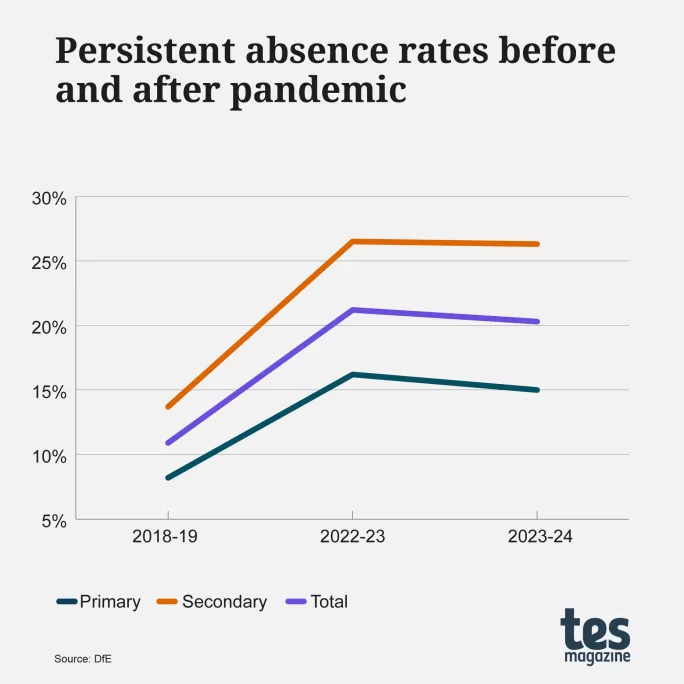Absence rates have remained stubbornly high despite the previous government’s campaign to boost attendance back to pre-pandemic levels, Department for Education data published today reveals.
The data shows that overall absence was 7.1 per cent across all schools this year.
Although this rate is slightly lower than last year (7.4 per cent), the overall absence rate continues to exceed the level in 2018-19 (4.7 per cent), the last full academic year before the Covid pandemic.
The rate of persistent absence decreased slightly this year to 20.3 per cent, compared with 21.2 per cent last year.
However, persistent absence - the proportion of pupils missing 10 per cent or more of their sessions - is still almost double the pre-pandemic level. Some 10.9 per cent of pupils were persistently absent in 2018-19.
The DfE said the latest figures were “much too high”.
Tackling high pupil absence
Former schools minister Damian Hinds previously told Tes that the Conservative government aimed to get overall absence below 5 per cent via an awareness campaign aimed at tackling parents’ more cautious approach to illness in the wake of the pandemic.
The campaign came after the government sent a letter to heads, signed by the chief medical officer Professor Chris Whitty and several relevant Royal medical college leaders, at the start of the 2023-24 academic year in an effort to encourage them to help “build up children’s confidence to attend school regularly”.
Mr Hinds, now shadow education secretary, suggested in January that parents now think “it’s appropriate for the child not to be in school” as a result of anxiety.
Although the Conservative government went on to roll out attendance hubs and attendance mentors to tackle absence, Mr Hinds later admitted that “faster progress” was needed to tackle the country’s “attendance problem”.
The new Labour government has said that its planned breakfast clubs policy - funding free breakfast clubs in every primary school - could cut 450,000 days of school absence among pupils.
Earlier this year Bridget Phillipson, who is now education secretary, said that a Labour government would use artificial intelligence to spot trends in absence.
Pepe Di’Iasio, general secretary of the Association of School and College Leaders, said that new data tools and attendance hubs introduced by the previous government will “likely only have a limited impact”. He called on the new government to be “much bolder” and acknowledge that “schools cannot fix this problem alone”.
A Department for Education spokesperson said: “Strong foundations of learning are grounded in attendance in the classroom, and these levels of absence are much too high.”
They added that the government will tackle the causes of absence, including by providing access to specialist mental health professionals in every secondary school, introducing free breakfast clubs in every primary and “ensuring earlier intervention in mainstream schools for pupils with special needs”.
For the latest education news and analysis delivered directly to your inbox every weekday morning, sign up to the Tes Daily newsletter





